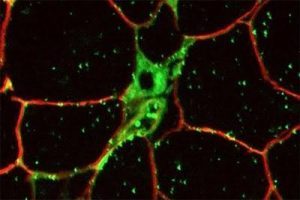- Home
- Editorial
- News
- Practice Guidelines
- Anesthesiology Guidelines
- Cancer Guidelines
- Cardiac Sciences Guidelines
- Critical Care Guidelines
- Dentistry Guidelines
- Dermatology Guidelines
- Diabetes and Endo Guidelines
- Diagnostics Guidelines
- ENT Guidelines
- Featured Practice Guidelines
- Gastroenterology Guidelines
- Geriatrics Guidelines
- Medicine Guidelines
- Nephrology Guidelines
- Neurosciences Guidelines
- Obs and Gynae Guidelines
- Ophthalmology Guidelines
- Orthopaedics Guidelines
- Paediatrics Guidelines
- Psychiatry Guidelines
- Pulmonology Guidelines
- Radiology Guidelines
- Surgery Guidelines
- Urology Guidelines
Cause of inflammation in diabetes identified

Inflammation is one of the main reasons why people with diabetes experience heart attacks, strokes, kidney problems and other, related complications. Now, in a surprise finding, researchers at Washington University School of Medicine in St. Louis have identified a possible trigger of chronic inflammation.
Too much fat in the diet promotes insulin resistance by spurring chronic inflammation. But the researchers discovered, in mice, that when certain immune cells can't manufacture fat, the mice don't develop diabetes and inflammation, even when consuming a high-fat diet.
The study is available as an advance online publication from the journal Nature.
"The number of people with diabetes has quadrupled worldwide over the last 20 years," said senior investigator Clay F. Semenkovich, the Irene E. and Michael M. Karl Professor and director of the Division of Endocrinology, Metabolism & Lipid Research at the School of Medicine. "We have made modest progress in making it less likely for some people with diabetes to have heart attacks and strokes. However, those receiving optimal therapy are still much more likely to die from complications driven by chronic inflammation that is, at least in part, generated by these immune cells.
"But by blocking the production of fat inside these cells, it may be possible to prevent inflammation in people with diabetes and even in other conditions, such as arthritis and cancer, in which chronic inflammation plays a role. This could have a profound impact on health."
Semenkovich's team made genetically altered mice that could not make the enzyme for fatty acid synthase (FAS) in immune cells called macrophages. Without the enzyme, it was impossible for the mice to synthesize fatty acids, a normal part of cell metabolism.
"We were surprised to find that the mice were protected from diet-induced diabetes," said first author Xiaochao Wei, PhD, an instructor of medicine. "They did not develop the insulin resistance and diabetes that normally would have been induced by a high-fat diet."
Through a series of experiments in the animals and in cell cultures, the researchers, including Douglas F. Covey, PhD, a professor of developmental biology and biochemistry, and Daniel S. Ory, MD, a professor of medicine and of cell biology and physiology, found that if macrophages could not synthesize fat from within, the external membranes of those cells could not respond to fat from outside the cells. That prevented the cells from contributing to inflammation.
But eliminating inflammation altogether is not the answer to preventing diabetic complications because inflammation is also vital for clearing infectious pathogens from the body and helps wounds heal. Still, Semenkovich said the new findings may have profound clinical implications.
"An inhibitor of fatty acid synthase actually is now in clinical trials as a potential cancer treatment," he explained. "And other drugs have been developed to inhibit fatty acid synthase in diabetes, too. One possibility that our work suggests is that altering the lipid content in the cell membrane may help block cancer metastases and complications of diabetes."
Drugs currently in use to block fatty acid synthase, as well as other developing strategies, potentially could allow for chronic inflammation to be blocked, without completely eliminating the ability of macrophages to fight infection.
The researchers also plan to take a look at existing drug compounds that change the lipid composition in cells. Such medications failed in clinical trials, but they may have an effect on the membranes of macrophages and therefore may lower the risk of diabetes complications, Semenkovich said.
You can read the full Article by clicking on the link :
- Xiaochao Wei, Haowei Song, Li Yin, Michael G. Rizzo, Rohini Sidhu, Douglas F. Covey, Daniel S. Ory, Clay F. Semenkovich. Fatty acid synthesis configures the plasma membrane for inflammation in diabetes. Nature, 2016; DOI: 10.1038/nature20117

Disclaimer: This site is primarily intended for healthcare professionals. Any content/information on this website does not replace the advice of medical and/or health professionals and should not be construed as medical/diagnostic advice/endorsement or prescription. Use of this site is subject to our terms of use, privacy policy, advertisement policy. © 2020 Minerva Medical Treatment Pvt Ltd